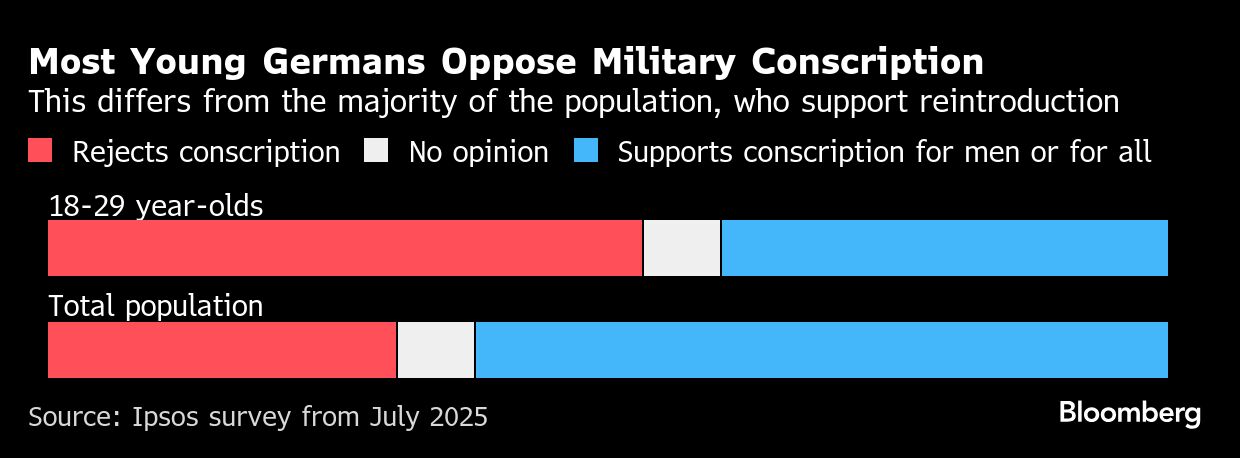() -- German Chancellor Friedrich Merz’s cabinet approved a draft law designed to significantly boost recruitment into the armed forces, part of its response to new security risks following Russia’s invasion of Ukraine.
While military service will remain voluntary, the law includes a provision that could revive compulsory conscription if numbers fall short, reversing the 2011 suspension of the draft. It would take effect in January once it gets backing from parliament.
The goal is to expand troop strength by about 180,000 to around 460,000, including at least 260,000 active soldiers and some 200,000 reservists, according to a document distributed by the government in Berlin.
“We want to make military service more attractive and convince more young people to sign up,” Merz said at a news conference in Berlin alongside Defense Minister Boris Pistorius, expressing optimism that the measures will be sufficient to recruit enough soldiers.
“But I would also add that if we determine that we need to take additional action then we will do that,” he added. “This is already written into the law.”
One of Merz’s top priorities since taking office in May has been to rebuild and expand Germany’s long-neglected armed forces and he has pledged to make the Bundeswehr Europe’s strongest conventional army.
The coalition of Merz’s conservative CDU/CSU bloc and Finance Minister Lars Klingbeil’s Social Democrats has effectively exempted defense spending from national borrowing restrictions but a shortage of Bundeswehr personnel and a lack of interest in a career in the armed forces among young people remain obstacles.

To underscore the importance of the law to Merz’s government, the cabinet held Wednesday’s meeting in the defense ministry rather than in the chancellery for the first time since 1992.
According to the draft law, a requirement will be introduced for 18-year-old men born in or after 2008 to complete a questionnaire about their health, skills and willingness to serve — part of efforts to encourage engagement with the Bundeswehr. From July 1, 2027 they will also have to submit to a medical.
The law — based on the ruling alliance’s coalition accord — doesn’t go far enough for some of Merz’s conservative allies, who wanted a provision that would automatically trigger conscription if the voluntary model fails to attract enough personnel.

Pistorius said earlier Wednesday he’s optimistic that the government can make serving in the armed forces attractive enough to avoid the need for the compulsory conscription that is standard practice among some NATO and European Union allies.
“It’s not about sending anyone to any front line, quite the opposite,” he told Deutschlandfunk radio.
“A strong Bundeswehr within NATO contributes to effective deterrence, so that no one has to go to war,” he added. “It’s about deterring anyone who might attack us.”
Thomas Erndl, a Bundestag lawmaker for Merz’s conservative bloc, vowed to push for adjustments to the draft law in the lower house of parliament.
“We will not allow it to pass without significant changes,” Erndl was quoted as saying Tuesday by the Tagesspiegel newspaper. “The Bundeswehr should say how many personnel it needs to fulfill its tasks and then be guaranteed this number — no more, but also no less.”
Read More About Germany’s Military Expansion:Germany Is One Step Closer Toward Reviving Military Conscription Germany Aims for NATO Goal With €162 Billion Budget by 2029 German Finance Chief Says Putin Threat Justifies Defense Buildup |
(Updates with Merz comments, cabinet approval starting in first paragraph.)
Most Read from
- To Boost Housing, Chicago Kills Parking Minimums
- Central Glasgow Could Be Poised for a Revival
- Chicago Schools’ Late Pension Payment Magnifies Fiscal Mess
- Germany Revives a Building Style With a Bleak History: Prefab Housing
- Trump Administration to Take Control of DC’s Union Station
©2025 L.P.
